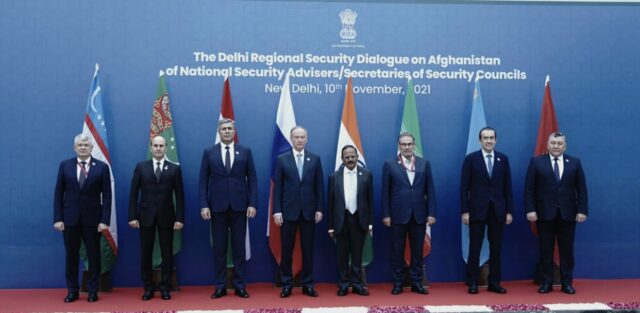NEW DELHI: The Regional Security Dialogue on Afghanistan, which saw India’s National Security Adviser Ajit Doval host the security czars of Russia, Iran and the five Central Asian states, ended in Delhi on a fairly predictable note. The Delhi Declaration included all those familiar references to ensuring Afghan soil was not used for terrorism purposes; called for an “Open and truly inclusive government”; and for preserving the “fundamental rights of women, children and minority communities.”
But reading between the lines there was little doubt a message was being sent to the Taliban leadership in Kabul and their backers in Islamabad. As Sushant Sareen of the Observer Research Foundation noted, by reiterating “strong support for a peaceful, secure and stable Afghanistan”, the declaration was pointing to the fragile nature of the Taliban state. It is a warning to the Taliban that they need to put their house in order
“The economy is bankrupt, there is no money to pay government servants, large swathes of the population face starvation, and if these issues are not addressed unrest would only grow,” Sareen told StratNewsGlobal. “The spate of attacks by the Islamic State Khorasan even in places like Kandahar, suggests all’s not well even in the Taliban’s home turf.”
Doval’s remarks can be read as hinting at iron resolve: “This is the time for close consultation amongst us, greater cooperation and interaction and coordination among the regional countries. I am confident that our deliberations will be productive, useful and help the people of Afghanistan and enhance our collective security.”
The Iranian delegate Rear Adm. Ali Shamkhani struck a similar note. “We appreciate the role that India has played as we believe they have a big role in Afghanistan. We hope this role will get bigger as there are a number of problems to deal with in Afghanistan such as terrorism, poverty, migration and not to mention the refugee crisis. The solution can only come if there is the participation of all-inclusive government, representing all ethnic groups in Afghanistan.”
Iran has enormous leverage in Afghanistan, notably the presence of the Fatemiyoun Brigade, Shia fighters who have returned to Afghanistan from the battle fields of Syria. If the Taliban turn on the Shia Hazaras, in the manner in which they did in the 1990s, Iran could well unleash the Fatemiyoun. There is also the Zainab Brigade of Pakistani Shias, who could be infiltrated into Afghanistan through Iran’s 1000-km long border.
Note also Nikolai Patrushev, Russia’s security council chief, who said, “Multilateral meetings … is an important format as it helps us to discuss a whole number of issues relating to the developing situation in Afghanistan at the highest level. It also helps us to devise practical solutions to counter challenges and threats emanating from Afghan territory.”
Last word, the declaration underscored the “firm commitment” of the member nations to ensure, “Afghanistan would never become a safe haven for global terrorism.”
















